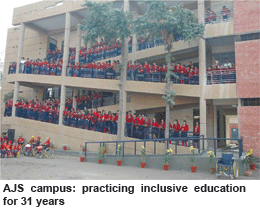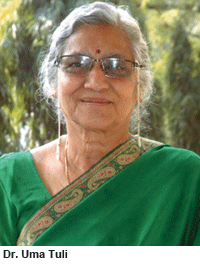Amar Jyoti School, Delhi
 Two years after the Right of Children to Free and Compulsory Education Act, 2009 — s. 12 (1) (c) of which mandates 25 percent reservation in all private aided and unaided schools in class I for children of disadvantaged groups — became law in April 2010, Parliament amended the Act to include India’s 40 million children with disabilities in the definition of disadvantaged groups. Regardless of this development, Amar Jyoti School, Delhi (AJS, estb. 1981) has been practicing inclusive education in its widest sense for the past 31 years, providing free-of-charge education to an equal number of disabled and non-disabled students since its inception.
Two years after the Right of Children to Free and Compulsory Education Act, 2009 — s. 12 (1) (c) of which mandates 25 percent reservation in all private aided and unaided schools in class I for children of disadvantaged groups — became law in April 2010, Parliament amended the Act to include India’s 40 million children with disabilities in the definition of disadvantaged groups. Regardless of this development, Amar Jyoti School, Delhi (AJS, estb. 1981) has been practicing inclusive education in its widest sense for the past 31 years, providing free-of-charge education to an equal number of disabled and non-disabled students since its inception.
Promoted by Dr. Uma Tuli, also the founder and managing secretary of the Amar Jyoti Charitable Trust, Amar Jyoti School, Delhi is a K-VIII school affiliated with CBSE (Central Board of Secondary Education) and NIOS (National Institute of Open School), and has an eponymous sister school in Gwalior also promoted by the trust in 1989.
Amar Jyoti School, Delhi was started with voluntary contributions of community members under a tree with 30 children, half of them disabled. It currently hosts 450 children, of whom 215 are children with special needs. “I first became aware that children with disabilities can study with non-disabled children in a barrier-free environment when my 21-year-old brother met with an accident, and faced the consequences of social attitudinal barriers. He eventually managed to go to the US for fitment of prosthesis. The inclusion under a tree became a normative concept much later. Our holistic approach involves teaching disabled and non-disabled children in the same environment. To meet the needs of special children, we have an occupational therapist and special educators in the school, with visiting specialist doctors to mainstream children into regular classes,” says Dr. Tuli, an alumna of Jiwaji University, Gwalior, with a Ph D in English literature from Delhi University and a Masters in special education from Manchester University, plus 30 years of teaching experience in several colleges in Delhi and Gwalior.
Unsurprisingly, this pioneer inclusive school has received a plethora of awards including two National Awards for creating a barrier-free environment for persons with disabilities and working for the cause of persons with disabilities through education, in 1995 and 2001 respectively, awarded by the Union ministry of social justice and empowerment.
Sited on a 1 acre plot with a built-up area of 13,500 sq. ft (with 20,000 sq. ft dedicated to the hospital rehabilitation block), Amar Jyoti School, Delhi offers 40 classrooms, with special classes being held for children with special needs. Ramps, tactile guide paths, loop induction facilities and buses fitted with hydraulic lifts pick and drop students, enabling easy access and equal education for children with disabilities. Apart from mandatory school infrastructure which includes well-equipped science and computer laboratories, a library with 10,000 volumes and ten newspaper subscriptions, the school also hosts a dedicated Braille Library with 760 Braille textbooks and 86 Braille story books for visually challenged students funded by The Asia Philanthropy Foundation.
 Moreover, medical services such as physiotherapy, speech and occupational therapy are provided within the school premises. Students are also required to enroll in at least one of the vocational courses offered such as computer training, beauty culture, arts and craft, fashion and jewellery design, bakery, cutting and tailoring etc. To keep the children abreast with technology and enhance the quality of education delivered, the school has tied up with Extramarks Education Pvt. Ltd to facilitate e-learning and e-tutoring.
Moreover, medical services such as physiotherapy, speech and occupational therapy are provided within the school premises. Students are also required to enroll in at least one of the vocational courses offered such as computer training, beauty culture, arts and craft, fashion and jewellery design, bakery, cutting and tailoring etc. To keep the children abreast with technology and enhance the quality of education delivered, the school has tied up with Extramarks Education Pvt. Ltd to facilitate e-learning and e-tutoring.
While children with disabilities are taught in special classes until they are ready for the mainstream, they are also encouraged to participate in all extra-curricular activities including sports such as cricket, basketball, archery etc.
“Children are consciously provided opportunities for social, recreational and vocational integration together with remedial academic education according to every child’s requirement. We promote inclusion through day-to-day activities as well. For instance, the news of the day during school assembly is read in Braille, and English alternatively. We have the national anthem rendered even by the hearing impaired in sign language,” says Tuli.
For providing this free-of-charge education to the school’s 450 children, Amar Jyoti School, Delhi incurs an annual expenditure of Rs.1 crore provided by way of government grants (Rs.20 lakh annually from the Union ministry of social justice and empowerment) and donations. “We have left no stone unturned to raise funds for our operations going door to door, organising cricket matches and writing thousands of letters to corporates, NGOs etc,” says Tuli.
Sponsors include the Tech Mahindra Foundation (sports development, English and science labs); the American Wives Association (furniture for nursery classes); the Rotary Club of Delhi (South End); the Star Key Foundation (hearing aids); Sharda Ma Enterprises Ltd and several donors from the US, Canada and India helping to construct the new school buildings at Gwalior. “Our computer training programmes are being supported by Dell,” says Dr. Tuli.
The heavy investment of time, money and effort into the education of AJS children is paying off. Encouraged by the felicitations, honours and encomiums the school has received from the government and NGOs, Dr. Tuli is optimistic about a better deal for India’s hitherto neglected disabled children. “While there are no plans to expand our Delhi school, we will soon be expanding the Gwalior school into a K-12 institution. Also in the pipeline are mentoring programmes for teachers in government and private schools to help them deal with special needs children, and enable other schools to follow our inclusive education model. Hopefully, with greater awareness about the needs of children with disabilities and the amended RTE Act, 2009, these children will now have opportunities to make meaningful contributions to national development,” says Tuli.
Wind in your sails, sister!
| Admission and fees
Admissions into Amar Jyoti School, Delhi happen in the month of July, against vacancies. Disabled and non-disabled children from disadvantaged soico-economic backgrounds are admitted through the Delhi-based NGO Akshay Pratishthan and the community rehabilitation programme of AJS. Tuition fees. Nil (The school is funded by public donations and the Union ministry of social justice and empowerment) For further details contact Amar Jyoti Research & Rehabiliation Centre, Karkardooma, Vikas Marg, Delhi 110 092; Phone: 91-11-22375205, 46866200, fax: 91-11-22372521, email: [email protected] |
Swati Roy (Delhi)
















Add comment